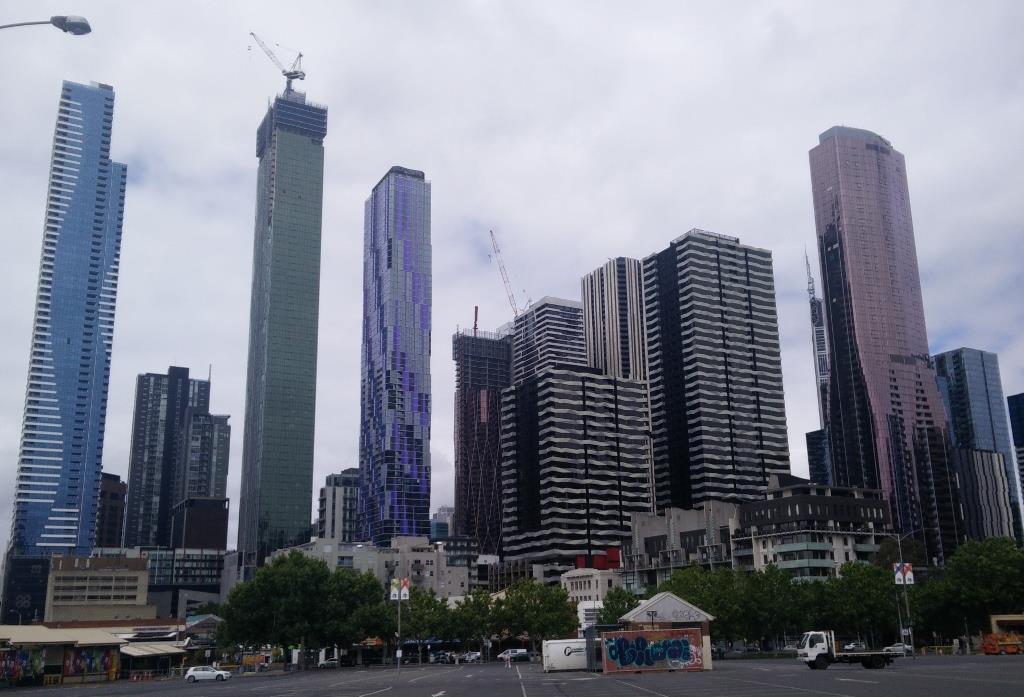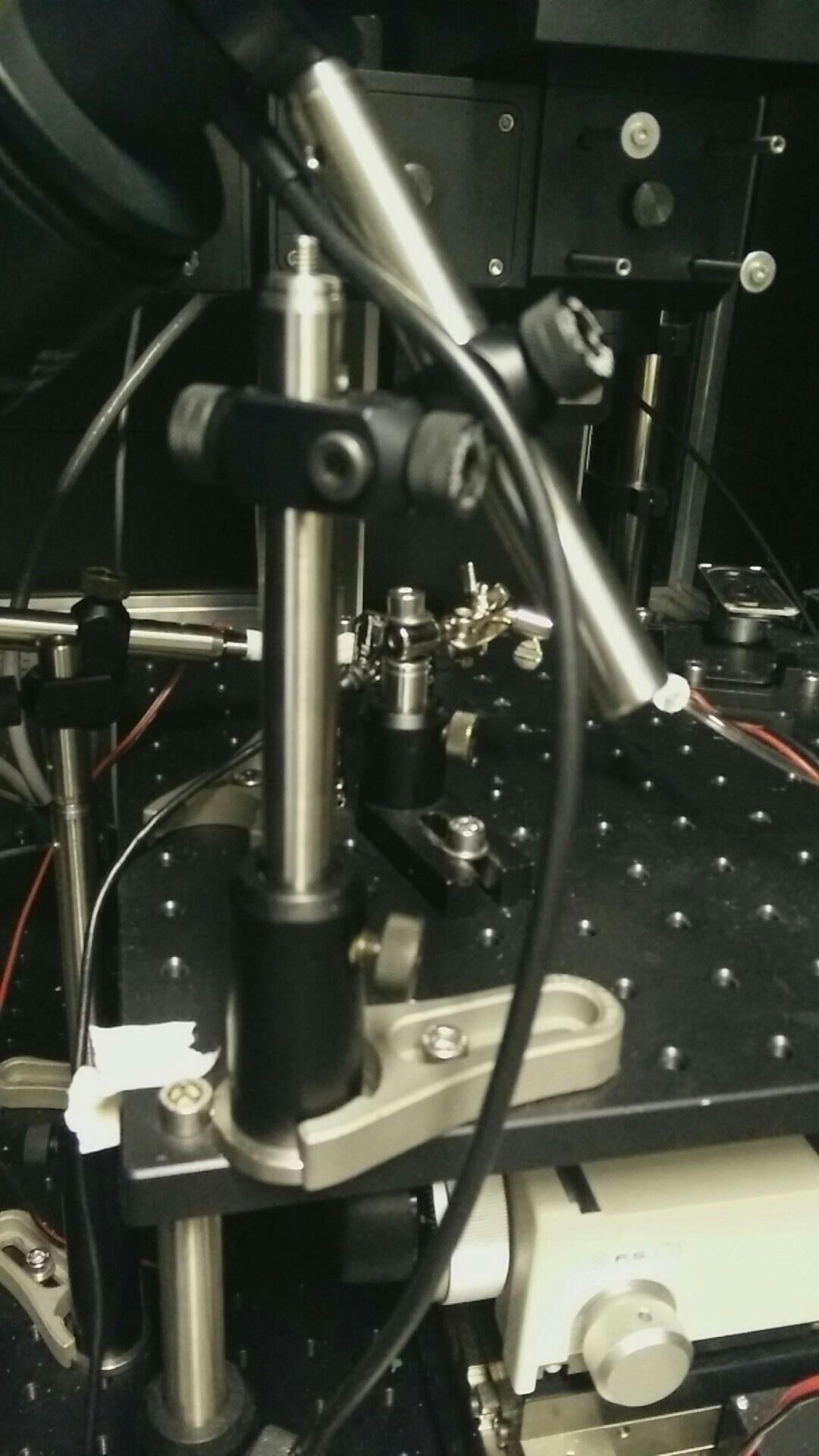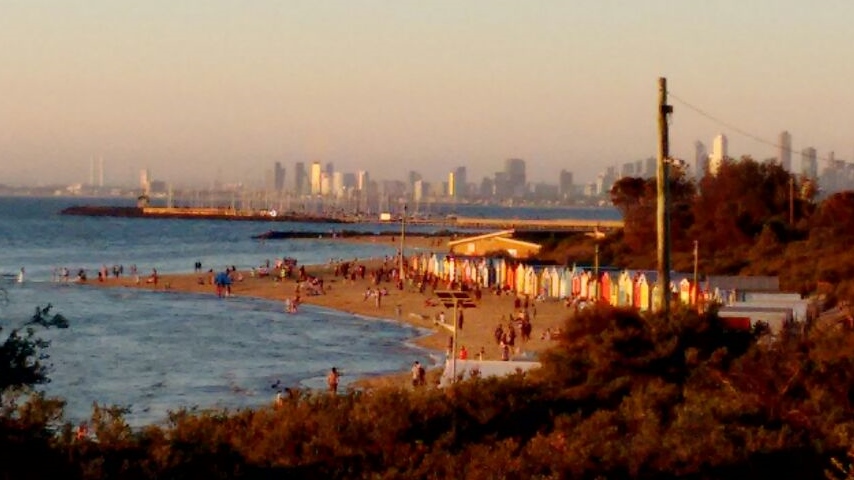Jay Wang, Global Grant Scholarship recipient from District 5360, doing his MSc in Neuroscience at the University of Heidelberg, hosted by the Rotary Club of Heidelberg-Schloss (Germany), writes to us from Melbourne, Australia, where he is now doing a lab rotation. In District 5360, Jay is sponsored by the Rotary Club of Calgary Olympic.
For more information on District 5360’s Global Grant Scholarship, visit http://www.rotary5360.ca/page/global-scholarship-funding.
20 November 2017
Dear Rotarians in District 5360:

Since the last update, I have travelled extra 10 hours into the future, leaving 18 hours of difference between home and me. Other than standing upside down relative to the Northern Hemisphere, I am still trying to adapt to the right-coming traffic. Nonetheless, it very much feels like home in many other aspects. Melbourne has many unique features, such as its impressive modern skyline that rivals with its European and North American cousins of similar size, and its distinctively local architecture that is of the marriage between European, Asian and “North American” influences. If Canada is the perfect example of cultural mosaic-ism, then Australia, or at least Melbourne, is the perfect example of the melting pot. There are entire streets of mixed-cultural shops and restaurants from all corners’ of the world. The Queen Victoria Market is also a dazzling place to spend hours in. Instead of large congregated cultural minority communities, everything is much more spread out all over the city. However, that is not to say it doesn’t have a Little Italy or Chinatown. It has this air of alternative familiarity, which surprises me at the most unexpected places and time. Nonetheless, research and social life have been sailing very smoothly
In terms of research, I have just finished all the induction processes into the institute.  The new project involves testing the learning-memory-behaviour circuits in mice, primarily in the sensory-motor neurons. We want to figure out if dendrites, the receiving end of all neurons, can dictate a learned behaviour, and therefore play a role in diseases. The plan is to use light-induced suppressions and stimulations, known as optogenetics, on the suspected circuits to tease out the mechanisms of action. The experimental subjects will undergo a mini brain surgery to receive these genetically modified light-responsive channels, whereupon activation by different colours of light, they can either stimulate or inhibit neurons firing. By specifically targeting the dendrites, we can figure out if they are involved in learning and memory. Currently, I am setting up a behaviour box for training the mice a specific response to stimuli around them. The mice will learn to lick and receive sugar water when the pad under its right paw vibrates and a specific tone is produced. Then we will do a series of experiments to see if we can disrupt this behaviour or elicit this response with only lights shining on their neurons. A deeper understanding of this network can help us explain how we perceive certain sensations, process that information, and use the interpretations to guide our actions. Unfortunately, these sensory-motor pathways we take for granted are disrupted in some Alzheimer’s patients. Hence, they cannot associate many sensory cues to their normal behaviours. The sight, smell, sound and touch of someone once familiar cannot trigger a reaction anymore in many late-stage Alzheimer’s patients.
The new project involves testing the learning-memory-behaviour circuits in mice, primarily in the sensory-motor neurons. We want to figure out if dendrites, the receiving end of all neurons, can dictate a learned behaviour, and therefore play a role in diseases. The plan is to use light-induced suppressions and stimulations, known as optogenetics, on the suspected circuits to tease out the mechanisms of action. The experimental subjects will undergo a mini brain surgery to receive these genetically modified light-responsive channels, whereupon activation by different colours of light, they can either stimulate or inhibit neurons firing. By specifically targeting the dendrites, we can figure out if they are involved in learning and memory. Currently, I am setting up a behaviour box for training the mice a specific response to stimuli around them. The mice will learn to lick and receive sugar water when the pad under its right paw vibrates and a specific tone is produced. Then we will do a series of experiments to see if we can disrupt this behaviour or elicit this response with only lights shining on their neurons. A deeper understanding of this network can help us explain how we perceive certain sensations, process that information, and use the interpretations to guide our actions. Unfortunately, these sensory-motor pathways we take for granted are disrupted in some Alzheimer’s patients. Hence, they cannot associate many sensory cues to their normal behaviours. The sight, smell, sound and touch of someone once familiar cannot trigger a reaction anymore in many late-stage Alzheimer’s patients.
 The new project involves testing the learning-memory-behaviour circuits in mice, primarily in the sensory-motor neurons. We want to figure out if dendrites, the receiving end of all neurons, can dictate a learned behaviour, and therefore play a role in diseases. The plan is to use light-induced suppressions and stimulations, known as optogenetics, on the suspected circuits to tease out the mechanisms of action. The experimental subjects will undergo a mini brain surgery to receive these genetically modified light-responsive channels, whereupon activation by different colours of light, they can either stimulate or inhibit neurons firing. By specifically targeting the dendrites, we can figure out if they are involved in learning and memory. Currently, I am setting up a behaviour box for training the mice a specific response to stimuli around them. The mice will learn to lick and receive sugar water when the pad under its right paw vibrates and a specific tone is produced. Then we will do a series of experiments to see if we can disrupt this behaviour or elicit this response with only lights shining on their neurons. A deeper understanding of this network can help us explain how we perceive certain sensations, process that information, and use the interpretations to guide our actions. Unfortunately, these sensory-motor pathways we take for granted are disrupted in some Alzheimer’s patients. Hence, they cannot associate many sensory cues to their normal behaviours. The sight, smell, sound and touch of someone once familiar cannot trigger a reaction anymore in many late-stage Alzheimer’s patients.
The new project involves testing the learning-memory-behaviour circuits in mice, primarily in the sensory-motor neurons. We want to figure out if dendrites, the receiving end of all neurons, can dictate a learned behaviour, and therefore play a role in diseases. The plan is to use light-induced suppressions and stimulations, known as optogenetics, on the suspected circuits to tease out the mechanisms of action. The experimental subjects will undergo a mini brain surgery to receive these genetically modified light-responsive channels, whereupon activation by different colours of light, they can either stimulate or inhibit neurons firing. By specifically targeting the dendrites, we can figure out if they are involved in learning and memory. Currently, I am setting up a behaviour box for training the mice a specific response to stimuli around them. The mice will learn to lick and receive sugar water when the pad under its right paw vibrates and a specific tone is produced. Then we will do a series of experiments to see if we can disrupt this behaviour or elicit this response with only lights shining on their neurons. A deeper understanding of this network can help us explain how we perceive certain sensations, process that information, and use the interpretations to guide our actions. Unfortunately, these sensory-motor pathways we take for granted are disrupted in some Alzheimer’s patients. Hence, they cannot associate many sensory cues to their normal behaviours. The sight, smell, sound and touch of someone once familiar cannot trigger a reaction anymore in many late-stage Alzheimer’s patients.Within the short two weeks, I have met a lot of like-minded young scientists and supportive colleagues in the Florey Institute of Neuroscience and Mental Health. I have joined two student groups: Students of Florey Institute (SOFI) and Students of Brain Research (SOBR). Both have provided many professional and social events such as seminars, journal clubs, career symposiums, and sports activities. I have been attending their weekly lunch talks, seminars, frisbee and soccer games. I also signed up to be a non-steering member of the SOBR committee.
Thanks to Dr. Kraay, I was able to quickly connect with the Melbourne Rotary Club and attend one of their meetings. Humorously, it’s the first Rotary meeting I could finally understand almost everything, apart from the Australian vocabularies. They have quite an interesting way to help rid the cumbersome coins in everyone’s pockets. An elected individual would amusingly list a number of things that will single out certain individuals in the room, and the chosen lucky few will have to drop a coin in a pan. For instance, those who checked the weather beforehand and wore short sleeves instead of formal shirts were called out to pay their short sleeve tax. Moreover, we also had a very interesting talk about leadership in institutions, with the Catholic Church at the centre of the discussion. I have been invited to the Paul Harris Breakfast where other local Global Grant Scholar will attend, as well as a Christmas BBQ (something I could really get used to, but a Christmas without snow is slightly disorienting, to say the least).
elected individual would amusingly list a number of things that will single out certain individuals in the room, and the chosen lucky few will have to drop a coin in a pan. For instance, those who checked the weather beforehand and wore short sleeves instead of formal shirts were called out to pay their short sleeve tax. Moreover, we also had a very interesting talk about leadership in institutions, with the Catholic Church at the centre of the discussion. I have been invited to the Paul Harris Breakfast where other local Global Grant Scholar will attend, as well as a Christmas BBQ (something I could really get used to, but a Christmas without snow is slightly disorienting, to say the least).
 elected individual would amusingly list a number of things that will single out certain individuals in the room, and the chosen lucky few will have to drop a coin in a pan. For instance, those who checked the weather beforehand and wore short sleeves instead of formal shirts were called out to pay their short sleeve tax. Moreover, we also had a very interesting talk about leadership in institutions, with the Catholic Church at the centre of the discussion. I have been invited to the Paul Harris Breakfast where other local Global Grant Scholar will attend, as well as a Christmas BBQ (something I could really get used to, but a Christmas without snow is slightly disorienting, to say the least).
elected individual would amusingly list a number of things that will single out certain individuals in the room, and the chosen lucky few will have to drop a coin in a pan. For instance, those who checked the weather beforehand and wore short sleeves instead of formal shirts were called out to pay their short sleeve tax. Moreover, we also had a very interesting talk about leadership in institutions, with the Catholic Church at the centre of the discussion. I have been invited to the Paul Harris Breakfast where other local Global Grant Scholar will attend, as well as a Christmas BBQ (something I could really get used to, but a Christmas without snow is slightly disorienting, to say the least).Sincerely,
Jay Wang